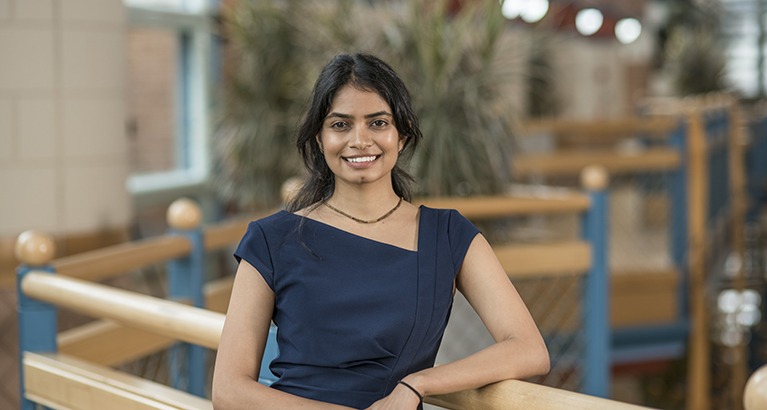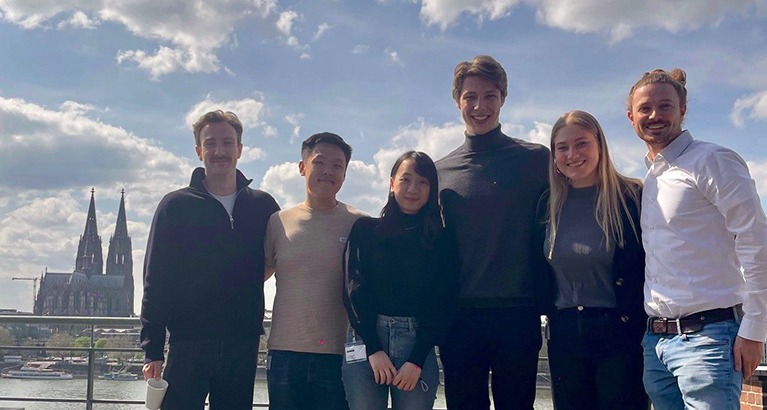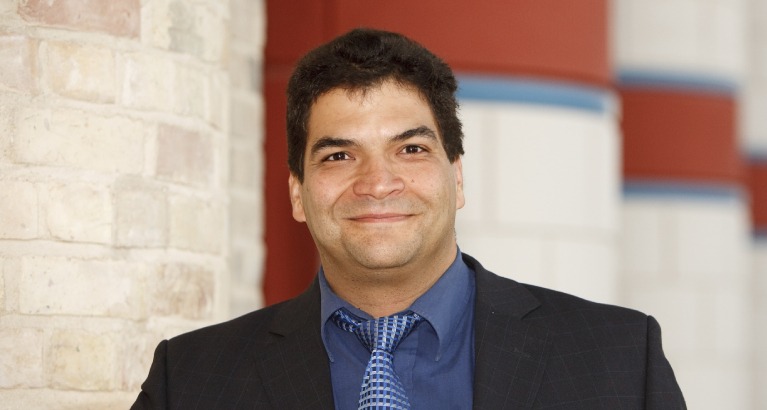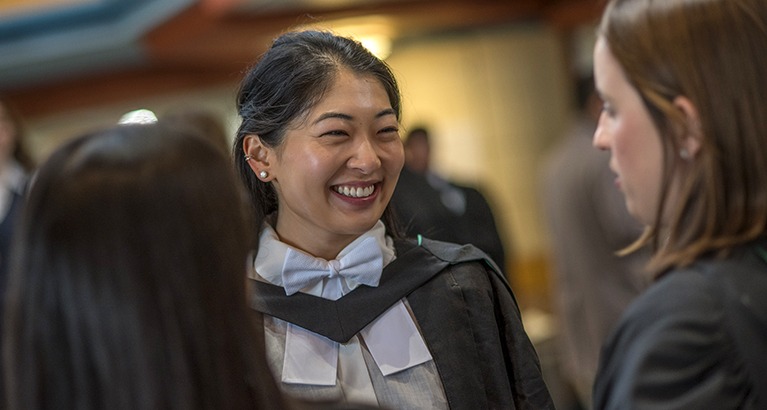“Sustainability and energy transition – the move towards renewable energy – are areas I have long been passionate about,” says Aarohi Dalal, Regulatory and Analytics Manager at VARO Energy, who graduated from the MBA programme at Cambridge Judge Business School in 2023. “Even during my undergraduate studies in engineering, my thesis revolved around maximising the efficiency of solar panels – but after that my path diverged a little. I decided to do the MBA because I wanted to pivot into sustainability and learn about the opportunities out there, while also gaining international exposure.”
Prior to the MBA, Aarohi was working in the telecommunications sector in Australia, leading commercial negotiations with suppliers. “It was an amazing role, and I grew a lot in the organisation thanks to some incredible mentors, but I wanted to learn more about opportunities in the energy sector,” she says. “I knew the MBA would help open doors and provide me with a good grounding in both general business and also sustainability and ESG.”
Sustainability and energy transition – the move towards renewable energy – are areas I have long been passionate about.
Making the triple jump
In our most recent Employment Report, we saw 97% of the class achieving at least one switch – either in function, sector or country. But a staggering 43% of our most recent graduates made the ‘triple jump’, a switch in all 3 – function, industry and country.
After the MBA, Aarohi did exactly that, making the triple jump in her career. She landed her current role while volunteering as co-president for the Cambridge University Energy Network (CUEN) – a student-led interest group at the University that brings together academics and business leaders to discuss key topics facing the energy sector and energy transition.
“I joined CUEN to connect with like-minded students and learn from them,” says Aarohi. “Our sponsor had links with many industry leaders, including those in VARO Energy. During the annual CUEN conference, I had the chance to hear from the firm – an energy company whose goal is to transition to a world of reliable, accessible sustainable energy – and it piqued my interest. I reached out to see if there might be an appropriate role for me within the organisation, even though I had no experience in the field.
“After that, we had a few calls to determine if I was the right fit for the company and vice versa. They valued my passion and skills more than my experience in the sector. The organisation was open to supporting my development on the job and created a new role in the firm.
“As Regulatory and Analytics Manager in the strategy team, my role is to understand EU and Swiss climate policies and see how they impact the company’s strategy in terms of investment decisions in green technologies,” she says. “Because it’s a new role, I also have input in shaping my job based on how it best fits within the organisation and its needs, which is really exciting.”
As Regulatory and Analytics Manager in the strategy team, my role is to understand EU and Swiss climate policies and see how they impact the company’s strategy in terms of investment decisions in green technologies. Because it’s a new role, I also have input in shaping my job based on how it best fits within the organisation and its needs, which is really exciting.
Life on the MBA at Cambridge
Aarohi says the combination of networking opportunities and skills gained from the MBA programme at Cambridge Judge helped make changing sectors, industries and countries more feasible.
“I specifically chose the Cambridge MBA because of its diversity,” she says. “You meet people from all over the world, who all bring their own diverse experiences to learn from – and not just in your cohort, but also within the wider University of Cambridge network.
“It really pushed me outside of my bubble,” she says. “As well as the academic side, the richness of MBA comes from being part of the wider community – both as a member of the Business School, your College and the University. There are many opportunities to meet with industry leaders, with events happening all the time, and there are opportunities to lead Cambridge Judge clubs, such as the Energy & Environment society, the Consulting and Entrepreneurship special interest groups (SIG),” she says. “Being part of a university that’s recognised and well-respected throughout Europe and across the world also really opens doors.”
She says the broader business skills gained on the MBA programme also helped make the transition smoother. “The programme is really well-rounded,” she says. “Not having worked in the energy industry before, it’s been a steep learning curve, but the skills I gained on the MBA have really helped.
“Having a broader understanding of business and the economy means you can solve problems using first principles – so you can add value without necessarily having expertise in a certain field,” she continues. “There were also a variety of core and elective courses for students interested in ESG and sustainability specifically, which gave me a really good grounding in these areas.”
Having a broader understanding of business and the economy means you can solve problems using first principles – so you can add value without necessarily having expertise in a certain field.
Making a positive impact through sustainability
So, what drew Aarohi to the ESG sector? “For me, it’s important to feel like you’re making an impact in your work and not just within your organisation – the sustainability sector allows me to do that,” she says. “I’m a firm believer that you spend way too much time of your life working to not be passionate about it, so I measure success by asking myself, ‘do I feel like I’m making a difference?’ And I do. Most of the time.”
“In my role, I get to see the implications of government policies, its impact on supply and demand, and ultimately how they influence the business case for a company. I’m seeing first-hand what I’ve learnt from MBA courses like Energy and Emissions Markets and Policies, and that’s really exciting.” She says there can be challenges – not least frustration around the rate of progress when it comes to change-making policies. “When we were studying courses related to climate change, I often felt that energy transition was happening too slowly,” she says. “It’s easy to feel discouraged when things move slowly or you feel you could be doing more, but it’s important to not let that subdue your passion – turning a ship is a slow process, but every step matters.”
In my role, I get to see the implications of government policies, its impact on supply and demand, and ultimately how they influence the business case for a company. I’m seeing first-hand what I’ve learnt from MBA courses like Energy and Emissions Markets and Policies, and that’s really exciting.
Top tips for those looking at a career in sustainability
Aarohi’s key piece of advice for current students looking to pursue a career in the field? “Leverage the network you have around you. My advice is to connect with your peers, join special interest groups, go to events, connect with students on other courses, and talk to people who are working in (or have worked in) the sector – and bring your authentic self to these interactions,” she says.
She also recommends looking at the industry from a wider lens. “Sustainability is a very broad topic and you can approach it from many different angles,” she says. “It isn’t just limited to the energy sector – every single industry is navigating what this means for them, from technology to consumer products, which means there are many opportunities, in many different shapes.
“Initially, I was quite focused on sustainability consulting or clean tech VC, but the more I understood about the industry, the more I became aware of various other opportunities,” she continues. “Many other students in my cohort were also interested in ESG and pursued it in a different way – from risk and VC to project consulting. There’s no one route in, so use the time during your MBA to find out which path you want to take.
“But also, if you’re new in the industry, my advice is to be open to taking a step in the right direction even if it’s not your ideal role – it could just be the stepping stone that leads you to where you want to be in the future.”
Many other students in my cohort were also interested in ESG and pursued it in a different way – from risk and VC to project consulting. There’s no one route in, so use the time during your MBA to find out which path you want to take.
Access the full report
Request your copy of the 2025 MBA employment report.
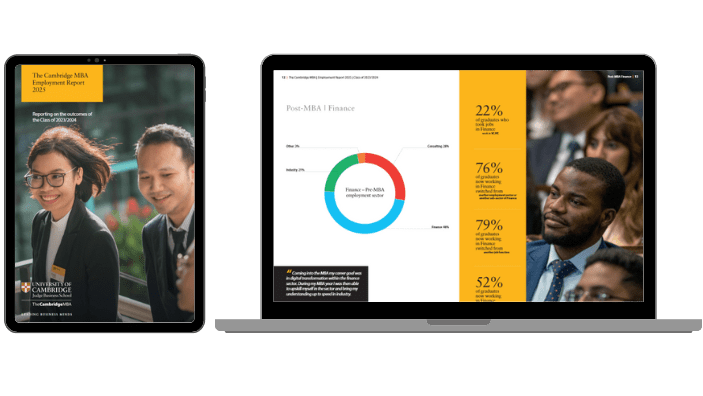
I was looking to transition in my career. The Cambridge MBA gave me space to explore different areas of interest.


